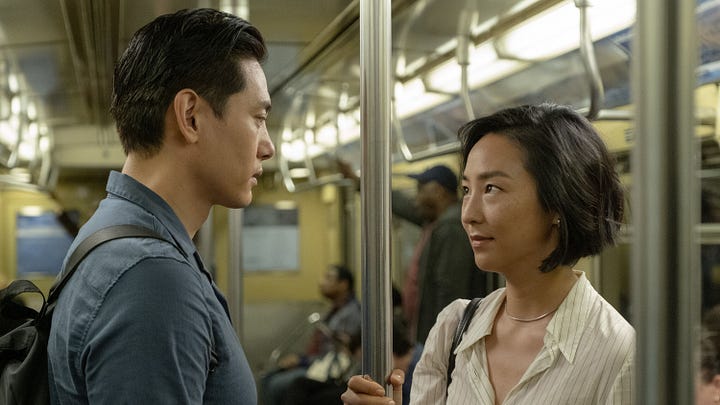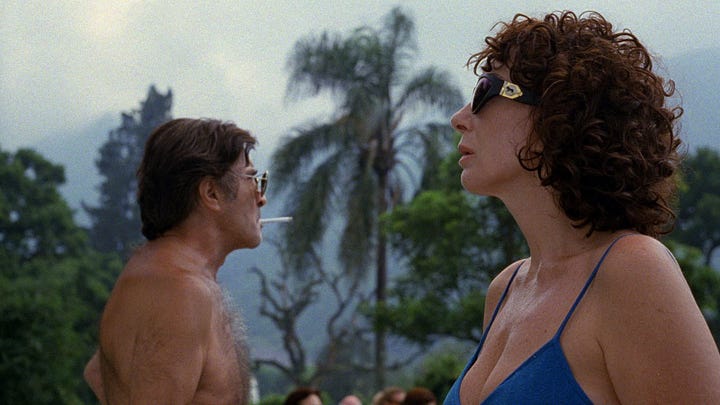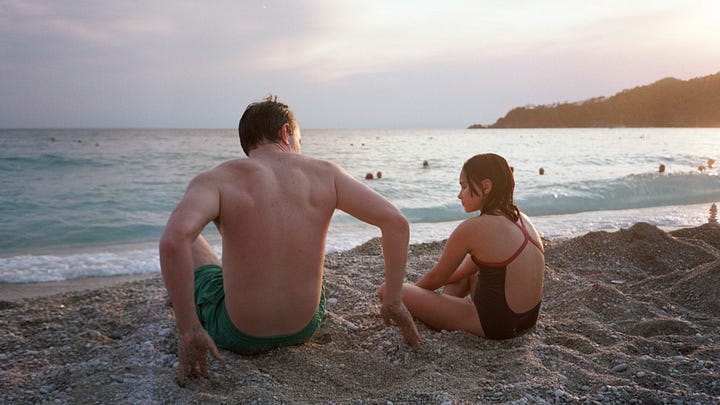Today we are going to take a look at Celine Song’s Past Lives, a film that has been almost unanimously praised by critics since its premiere at the 2023 Sundance Film Festival.
Since the film is going to be available on VOD tomorrow (i.e., to rent on Apple TV or Amazon) , I wanted to give a non-spoiler review of the film, so here it is.
It is interesting how it has many similarities to the film we examined last week: The Umbrellas of Cherbourg. Although it handles it very differently, I do think it makes a very interesting double feature, so if you have the time, watch both and let me know what you think.
Beauty through Words Only: Celine Song’s Past Lives
Production from the United States and the Republic of Korea. Released in 2023.


What a good story this is. Childhood sweethearts who reconnect twenty years later realize they were meant for each other. In the story I would be the evil white American [partner] standing in the way of destiny.
Put in simple terms, this quote is central to the story of Celine Song’s Past Lives, which it examines and challenges in equal measure. A film about fate, love, idealism, identity and what ifs, it has taken the film community by storm to become probably the most critically-acclaimed film of the year. Even though it does have its very strong parts throughout, I felt a little mixed towards the end. Its acting and dialogue have great things in it, but the structure and technical elements don’t do enough to elevate the material in a way that other films manage to do (as, say, last week’s focus: The Umbrellas of Cherbourg).
The plot goes like this: Nora (Greta Lee) and Hae Sung (Teo Yoo) are childhood friends in Korea who could be something more, but she moves with her family to Canada, leaving her friend and her country behind. Years later, even as she is in a committed relationship with Arthur (John Magaro), they reconnect and grapple with what could have happened to them if things happened differently. The greatest strength of Past Lives lies in its acting trio of Lee, Yoo and Magaro, who all master the subtlety of slight glances and stares, body language and overall restraint. Particularly Lee carries the weight of the film on her shoulders as she builds amazing chemistry with her co-stars and delivers her lines with a sense of both naturalism and emotionality as she comes to terms with her feelings. The acting is very internal in how she layers what she feels in her face with what she says and how both convey different things, reminding me of Setsuko Hara in Yasujiro Ozu’s films, who use her collected manner to achieve a great emotional effect towards the end (see: Ozu’s works starting from Late Spring onwards).
Yoo and Magaro are also pretty good playing Nora’s love interests, as each master the internal worlds of their characters as well as Lee does with hers. Yoo stands out both in his scenes in Korea and eventually in New York as he treads a fine balance between his very masculine persona and a sense of vulnerability and longing that feels very in touch with those tied to the ideal of ‘wanting to provide as a male partner’ and at the same time believing in convictions of fate. Magaro on the other hand continues his winning streak of great performances in great films as someone who treads another fine line of trusting in his partner but also knowing the frustration of not being able to access a whole part of someone because of a cultural and language barrier. All performances are amazing to behold and elevate everything within the film.
The other big strength of the film lies in its dialogue. As someone who started out as a playwright, it is no surprise that writer-director Celine Song knows how to frame conversations and dynamics between people. Some of it can seem very in-your-face -which I will get to later-, but in some scenes, particularly one between Lee’s Nora and Magaro’s Arthur, the conversation they have is beautiful in how both know exactly what words to use to articulate their feelings of doubt, longing, nostalgia, and understanding of where their feelings come from. Some might point out that those conversations unrealistic, but seeing that both characters are writers, it makes sense to see both in a place where they know and master what words to use. Another great moment of the film comes in its second act where Song uses montage to track Nora and Hae Sung’s first reconnection, moving at a fast pace and with a sense of efficiency akin to the first act of Wong Kar-wai’s In the Mood for Love. That moment does not last for long, but it is a definite highlight in a film that otherwise is not as stylistically interesting.
Moving on to Past Lives’ style, the clearest influences I saw in Song’s filmmaking were the films of Edward Yang and, again, Yasujiro Ozu; but in both cases, the stylistic choices she makes influenced by these filmmakers feel superficial and not quite reaching the point of what they achieved. Edward Yang uses cross-cutting to connect events, settings or actions, and also uses shots of reflections or characters looking at windows to show how the story of one character or one family feels connected to the larger story of a community or a country. Yang perfected this style in A Brighter Summer Day and especially Yi Yi. In Past Lives, Song does use shots of windows to look to South Korea and New York City, but not providing that deep enough point to connect the characters with any thematic element. It is all characters in cars or apartments looking out, contemplating their inner situation, and not much else, no visual cues.
In the case of Ozu, his style is very austere, opting for no camera movement and only framing conversations, not dramatic action, building a slowly-moving pace that eventually explodes in a third act that pays off every emotional beat set up beforehand, as it happens in the end of Tokyo Story when Setsuko Hara’s character finally bursts into tears as she grapples with everything that happened and her own contradictory feelings surrounding those events. In Past Lives, I felt like Song framed a similar picture with minimal action within the characters’ interactions, using Greta Lee as a Setsuko Hara insert. It does have an emotional moment at the end, but pay-off is not as strong as it should be, both for formal and stylistic reasons.
Because she started out as a playwright, it makes sense that Song chooses to make most of her points through very strong dialogue, but that comes at the expense of strong visuals to signal better storytelling. In addition, most of the time her dialogue is very direct and obvious, losing the nuance that favors the quietness of the film. Song and her cinematographer Shabier Kirchner do not provide the visuals to support the themes that she sets up through dialogue, and I even feel that they could have made better choices in how to frame shots. The big exchanges through close-ups would have felt more natural through medium two shots, and the big final moment kept us at a distance with a full shot when a close-up or even a medium close-up would have enhanced the eventual pay-off a lot more.
Finally, the film thematically is very similar to The Umbrellas of Cherbourg, commenting on fate, love that transcends time, the unromantic nature that true love reaches and time and place as the fateful defining moment where love needs to thrive. It's all framed through the conversations that the characters have and it’s fascinating how each interprets the events that occur in a different manner but ultimately come to the same conclusion in a way that is respectful to every party’s feelings. What I found most interesting is its comment on certain moments of our lives being considered past lives themselves, and us becoming different people and drifting from certain other people as a natural form of humans moving onto other things. It also challenges conceptions on how love should evolve, and that real-life decisions in real-life situations that feel unromantic are not necessarily in contrast to what love should look or feel like.
All of the thematic elements connect with Nora’s final decision which I will not spoil. It is one that divides viewers in a good way to ignite discussions, as it did for me when I watched it with a group of friends. It does so to enhance the very fine line the film threads in its definition and application of true love and how that love morphs as people grow and evolve.
Overall, Past Lives is a good film that leans heavily on the actors and dialogue to convey its ideas surrounding love, fate and time, eschewing the use of style and visuals to convey those same themes. Even though I am in the minority in feeling somewhat mixed, I do recommend everyone reading to watch the film as it leaves each viewer with a different interpretation on what should have happened. It is not perfect, but I do believe that Past Lives serves as an introduction to Celine Song, who if given the chance to perfect her craft, I am sure will go on to make amazing films in the future. More than a good film, Past Lives is the announcement of a future great talent.
Feature directorial debuts
It is always fascinating to see where a director chooses to start their career as a filmmaker. Some like Spielberg start with lesser films, as his debut Duel fell into obscurity aside the gigantic success of Jaws, his third feature film. Others like Orson Welles make their biggest splash with their debut, as he did with Citizen Kane.
In Celine Song’s case, even though she has gotten a ton of acclaim, for me she falls into the ‘Spielberg’ category of sorts, she has lots of potential and will probably do better next time. As for those who make a big debut as Welles did, who have been the biggest debuts in the 21st Century? My list would go like this (in alphabetical order):


[pictured from left to right: La Ciénaga, Aftersun]
Aftersun (Charlotte Wells, 2022)
La Ciénaga (Lucrecia Martel, 2001)
Get Out (Jordan Peele, 2017)
Hereditary (Ari Aster, 2018)
Synecdoche, New York (Charlie Kaufman, 2008)
All except Wells -who only released her debut last year- have already released multiple other features that prove their worth. Of these directors, I particularly recommend Martel’s The Headless Woman and Zama, Peele’s Nope and Aster’s Midsommar and Beau is Afraid, all very original works that have stayed with me as thematically dense and entertaining works.
To close off this section, I will say that from this year, I’m missing the acclaimed debuts of Michael and Danny Philippou in Talk to Me and Savanah Leaf in Earth Mama. If they are worth it, I’ll be sure to share my thoughts.







